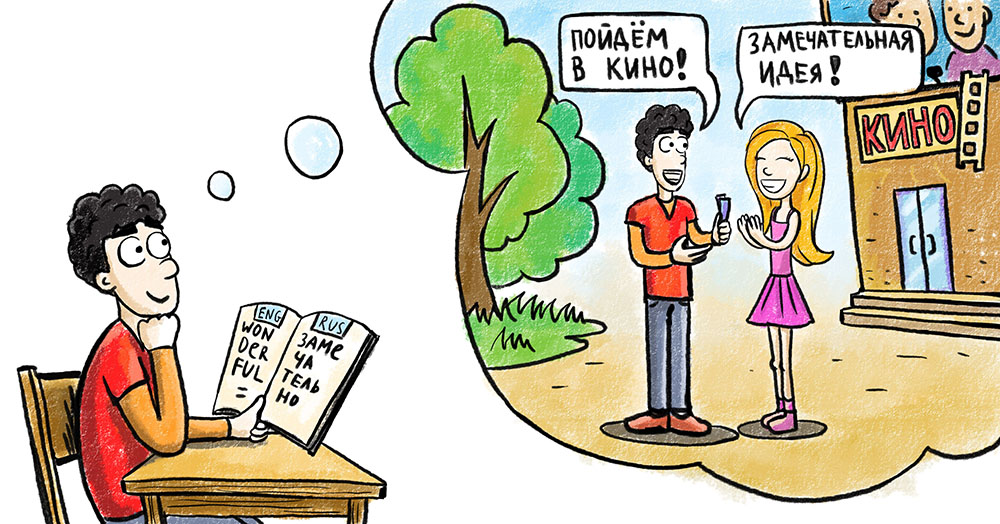Visualisation and language learning
Visualisation is the process of creating mental images with a certain purpose. Top performers know very well the importance of picturing themselves succeeding in their minds before they do in reality. Michael Jordan always used to take a last shot in his mind before he took one in real life. Muhammad Ali always visualised knocking out his opponent well before entering the ring. Researchers in the Cleveland Clinic Foundation compared people who trained to build their muscles to those who just visualised themselves training. The ones who trained in reality increased their muscle strength by 30%. However, the ones who just performed mental workouts increased muscle strength by almost half as much (13.5% – see scientific paper here).
Visualisation can be applied to language learning too with astonishing results. Jane Arnold, a professor of language teaching methodology at University of Seville, has extensively written about this (see sample pages of her book here). She recalls that her interest in visualisation was prompted by an American Scholar who saved hours of studying by visualising himself speaking fluently in Italian and French before travelling to Europe for summer conferences.
Let’s now look at an example of how you can add visualisation to your Russian language learning. Suppose you have just learned a new word – замечательная: wonderful. Now close your eyes and imagine a real-life dialog between you and another Russian speaker in which you use this new word. One example follows below between you and Olya:
Olya: Привет! – Hi!
You: Привет! Как дела? – Hi! How are you?
Olya: Хорошо, спасибо! – Good, thanks!
You: Ты не работаешь сегодня? – Are you not working today?
Olya: Нет! Я отдыхаю сегодня! – No! I am resting today!
You: Как здорово! Пойдем в кино? – How nice! Shall we go to the cinema?
Olya: Да, это замечательная идея! – Yes, this is a wonderful idea!
Visualisation is effective as it forces you to pay attention. Ed Cooke, a memory champion, says that attention is the single most important thing in memorisation. In the above example, you need to focus to synthesise all the information, the dialog, the environment, the actors.
When you visualise you should involve all your senses. Maybe a mental image is more closely related to the sense of sight. However, next time you stumble over the words ‘хлеб’ (bread) or ‘скрипка’ (violin), you will see that you can easily visualise the nice smell of freshly baked bread or the beautiful sound of violin. Also, feel free to exaggerate with your imagination; think of unusual images which will make your visualisations and memories last longer.
Visualisation can be even more powerful when it engages you emotionally. In our example above, you are covered with joy as Olya accepts to go to the cinema with you. Visualise yourself speaking fluently in Russian and being confident. That will certainly take you a step closer to the goal.
Finally, it is well known that we learn better in a state of calmness. When we visualise, we are in a state of alertness and calmness; this is exactly the state in which we achieve optimal results in learning. Finally, I just wanted to mention how we say visualisation in Russian in case your Russian friends ask you how you learned the language so quickly. It is an easy one, give it a guess! Визуализация!
PS: Please note also that in the above dialogue, a more natural response from Olya or a native speaker, would be something like: Да… конечно… почему нет? (Yes, sure, why not?) or, Да… конечно… пойдем! (Yes, sure, let’s go!) or, Конечно… да… давай! (Sure, yes, come on). Special thanks to Mikhail Katykhov (Adjunct Professor of Business at Lakeland College Japan) and Славик (see comment below) for this nice piece of feedback.


6 Comments
Thank you Angelos, I need it!
Glad you liked it Amico Pino Giorgio! Enjoy!
Wonderful idea = чудесная идея.
Чудесно! Спасибо Dan! 🙂
I do not think in Russian you should respond with “Да, это замечательная идея!”. This kind of statement sounds more like a literal translation of a american dialog. In Russian you would most likely say “Пойдем!” in response. I do not know if I have any ‘scientific’ justification for that. I just feel like in Russia’s context you would respond to the ‘offer’ , rather than ‘evaluate’ the ‘offer’.
Similarly, I would be rather expect to hear “У меня сегодня выходной” instead of “Я сегодня отдыхаю” in the context of this dialog. But that might be only me 🙂
Very good points Славик, thank you! I like your interpretation of ‘responding to the offer’. Your answer is more natural and statistically more likely! I just stretched it here a little bit to accommodate ‘замечательная’! Спасибо большое!